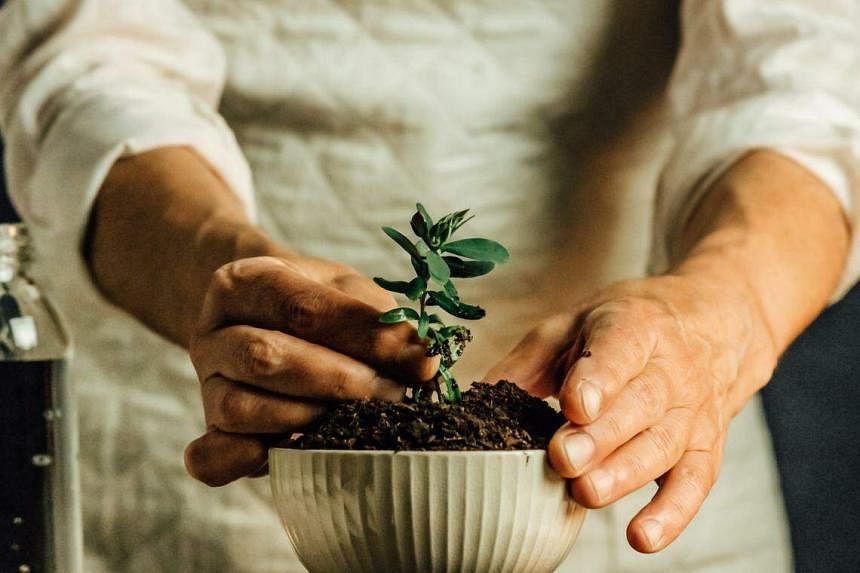Whenever her plants show signs of disease like wilting or yellowing leaves, Ms Joo Young-hyun immediately heads to a hospital – one that is dedicated to plants.
Recently, she took her potted rosemary and lavender plants to a facility in Seocho-gu, Seoul, as their leaves started to droop and shed.
Launched by the Seoul metropolitan government in April, this general hospital, located inside the Seoul Agricultural Technology Centre, offers care services and free expert consultations.
The doctor’s diagnosis was “overwatering”, with too much water reducing the oxygen in the soil. Her herbs’ roots were found to be partially rotten due to a drainage problem.
To revive the plants she received as gifts from her parents, Ms Joo said yes to treatment, including repotting, soil replacement, careful watering and lighting.
After 10 days of extensive care at the hospital, the herbs were nursed back to health and returned to her house. “Some people fix their overwatered plants on their own by getting tips from YouTube videos, but I was afraid of failure. I needed the help of professionals,” she said.
“Plants are no different from pet animals like dogs or cats. Many of them are given names from their caretakers.”
Ms Joo is one of many home gardeners in South Korea to whom plants are more than just a prop for interior decoration.
Plant aficionados tend to have a large garden or a plant vivarium inside their homes to nurture various blooms, seeing them as companion “pets”.
A search with the hashtag “pet plants” or “plant butler” in Korean on Instagram returns tens of thousands of pictures and short videos shared by home gardeners.
A 31-year-old office worker in Seoul, who wants to be called Ms Han, said: “Watering plants and recording how much they have grown with a camera after work has become an important part of my daily life.”
“Looking at sprouts grown from small seeds fills me with a sense of wonder at the miracle of life,” she added.
Amid the home gardening boom, Seoul city also opened small-scale plant clinics in four districts to offer expert advice and simple treatments. In cases where the plants need more intensive help, the owners can visit the hospital in the Seoul Agricultural Technology Centre.
“Plant hospitals and clinics are places where plants can receive diagnoses and prescriptions... just as pets get veterinary care when they are sick. We plan to... help citizens find emotional stability and physical health through companion plants,” said Mr Park Jae-yong, an official at the Labour Fair Coexistence Policy Office under the Seoul metropolitan government.
The recent surge in the popularity of house plants has added new vigour to local “planterior” start-ups. The newly coined term refers to the use of plants in interior design.
New businesses such as shops featuring a curated selection of plants and indoor gardening supplies and plant care services have emerged.
One shop run by gardening brand Macho’s Sachunki serves as a plant boarding facility. People can bring their plants for short-term stays of up to two weeks. Gardening experts there offer basic maintenance services like potting, cleaning and watering, which are free of charge.
Another planterior start-up, Sikmul Hall, offers plant care visits targeting beginners or busy office workers.
Its plant sitters look after their indoor plants while they are away and provide customised information about growing plants, including sunlight requirements or repotting.
Find relief from greenery
Plant lovers said they are driven by a desire for emotional therapy.
According to a survey of 874 home gardeners by the Rural Development Administration between September and October last year, 55 per cent of the respondents said they grow plants “to become emotionally stable”.
Twenty-seven per cent said they turned to plants “to purify the air” while 14 per cent said they tapped the blooms “to decorate homes”.
Some experts said the pandemic lockdowns and restrictions led to more people to seek comfort from nature.
“People’s instinctive desire for an interaction with nature, which was constrained by Covid-19, naturally led them to grow plants at home,” said psychiatry professor Jo Young-tak at Kangdong Sacred Heart Hospital.
“When touching soil and plants, people can feel connected to nature. They can also feel rewarded while watching their plants grow, day by day. These positive emotions trigger the release of serotonin, often referred to as the ‘happiness hormone’ in the brain, which soothes feelings of anxiety and depression.” THE KOREA HERALD/ASIA NEWS NETWORK

